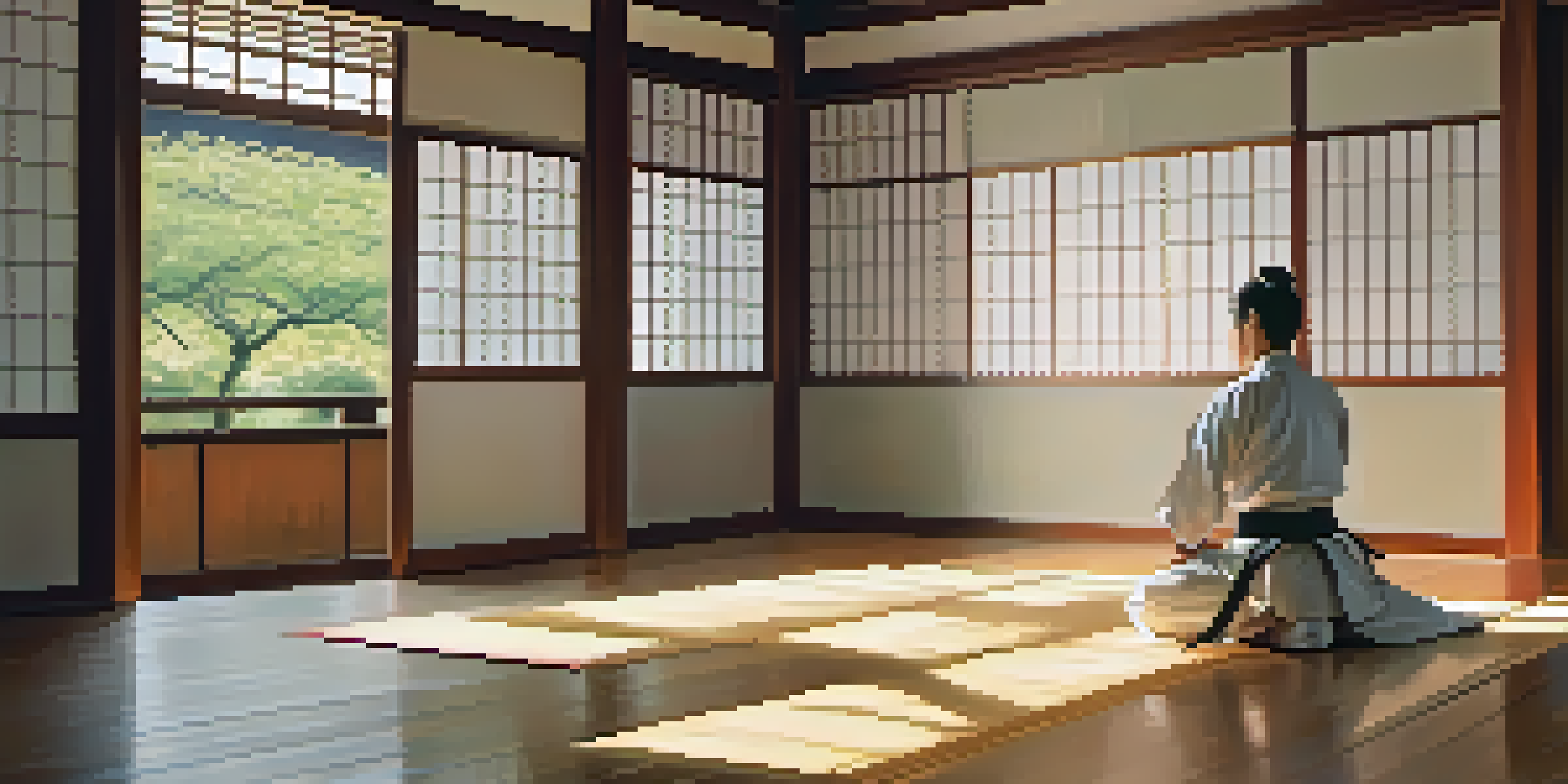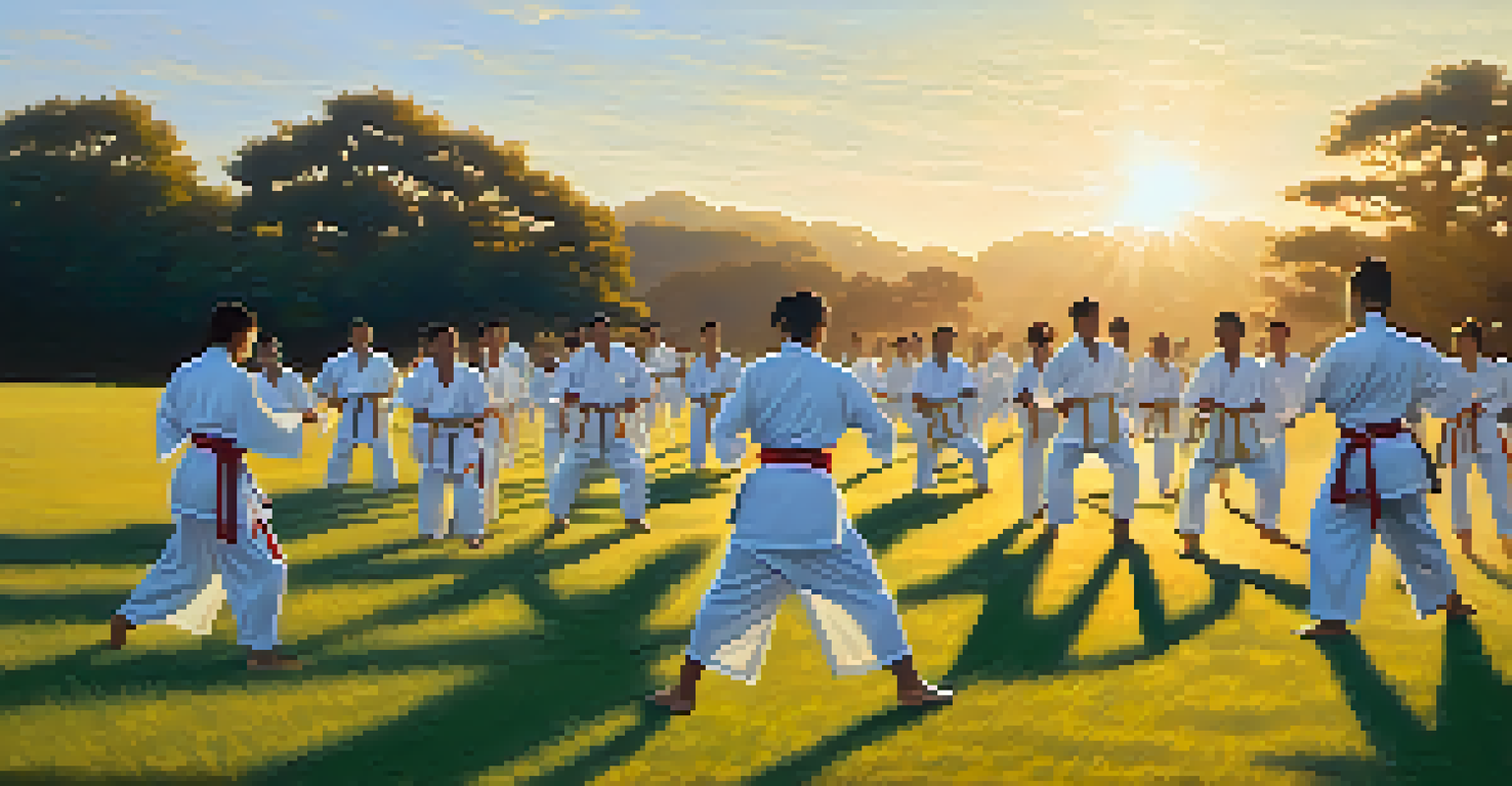The Connection Between Martial Arts and Self-Discipline

Understanding Self-Discipline in Martial Arts
Self-discipline is the backbone of martial arts training. It involves the ability to control one's emotions, behavior, and desires in the pursuit of long-term goals. Practicing martial arts requires a commitment to regular training, which instills a sense of responsibility in practitioners. This commitment not only enhances physical skills but also builds mental resilience.
Discipline is the bridge between goals and accomplishment.
As martial artists progress, they learn to set personal goals, whether it's mastering a new technique or preparing for a competition. These goals act as benchmarks, helping practitioners assess their progress and stay motivated. Each achievement reinforces the importance of discipline, creating a cycle of growth and improvement.
Moreover, self-discipline gained through martial arts extends beyond the dojo. Practitioners often find that the focus and determination they develop translates into other areas of life, such as academics or career pursuits. This holistic approach to discipline makes martial arts a valuable tool for personal development.
The Role of Regular Training and Routines
Regular training is crucial in martial arts, as it fosters a routine that encourages self-discipline. Students learn to prioritize their practice sessions, often committing to a rigorous schedule that can span several days a week. This consistency not only builds physical skills but also reinforces the habit of dedication and persistence.

Routines in martial arts often include warm-ups, drills, sparring, and cooldowns. Each segment of training requires focus and discipline, reminding practitioners that every detail matters in their development. Over time, these routines become second nature, making it easier for students to stick with their training even when motivation wanes.
Self-Discipline Fuels Growth
The self-discipline gained through martial arts training enhances both physical skills and mental resilience, fostering personal development.
Furthermore, having a structured training environment contributes to self-discipline. Instructors emphasize the importance of punctuality, respect, and effort, creating a culture where these values are upheld. This environment nurtures a sense of accountability, encouraging students to take their commitment seriously.
Mastering Techniques Through Repetition
Martial arts heavily relies on the principle of repetition to master techniques. Practitioners repeat moves countless times until they become second nature, which requires significant self-discipline. This repetition teaches students that mastery doesn't happen overnight—it takes dedication and a willingness to face challenges repeatedly.
The more you sweat in peace, the less you bleed in war.
As students practice, they often encounter frustration and setbacks. Learning to navigate these obstacles is a vital part of building self-discipline. Instead of giving up, martial artists are taught to persist, reflecting the idea that struggle is an essential part of the learning process.
This journey of mastering techniques through repetition also cultivates patience. Students learn that progress can be slow, but consistency yields results over time. This patience translates into other aspects of life, helping practitioners to approach challenges with a steady mindset.
The Importance of Goal Setting
Goal setting is a powerful tool in martial arts training that nurtures self-discipline. Instructors often encourage students to set both short-term and long-term goals, such as earning a new belt or perfecting a specific technique. These goals give students something tangible to strive for, making the discipline required to achieve them feel purposeful.
Having clear goals helps practitioners to track their progress and stay motivated. Celebrating small victories along the way reinforces the importance of self-discipline, as each achievement serves as a reminder of their commitment. This cycle of setting goals, achieving them, and setting new ones fosters an ongoing development process.
Routine Builds Commitment
Regular training routines in martial arts instill a habit of dedication and persistence, essential for mastering techniques and achieving goals.
Moreover, the act of setting and revisiting goals teaches martial artists to evaluate their own performance honestly. This self-reflection cultivates a mindset of continuous improvement, where discipline is not just about sticking to routines but also about striving for excellence.
Building Resilience and Overcoming Challenges
Martial arts training is filled with challenges, both physical and mental. Every time a student faces a difficult technique or an intimidating opponent, they must tap into their self-discipline to push through. This process fosters resilience, teaching practitioners that overcoming obstacles is part of growth.
The journey of martial arts also teaches students how to handle failure. Instead of viewing setbacks as defeats, practitioners learn to see them as opportunities for improvement. This shift in perspective is where self-discipline plays a crucial role, as it encourages students to keep trying despite the difficulties they encounter.
As students become more resilient, they start to develop a mindset that embraces challenges in all areas of life. The self-discipline cultivated through martial arts empowers individuals to tackle personal and professional obstacles with confidence and determination.
Discipline Through Respect and Etiquette
Respect and etiquette are fundamental principles in martial arts that directly contribute to self-discipline. From bowing to instructors to greeting fellow practitioners, these rituals instill a sense of humility and respect. Understanding the importance of these practices reinforces the idea that discipline is not just about personal achievement but also about valuing others.
Practitioners learn that respect is a two-way street. By showing respect to their instructors and peers, they cultivate an environment that promotes growth and learning. This communal aspect of martial arts training fosters a sense of accountability, as everyone is invested in each other's progress.
Life Skills Through Martial Arts
The discipline learned in martial arts translates into valuable life skills, helping practitioners manage challenges and responsibilities effectively.
As students internalize these values, they begin to practice self-discipline in their daily lives. The lessons learned in the dojo—such as treating others with kindness and maintaining humility—translate into respectful behavior outside of martial arts, shaping individuals who are not only disciplined but also considerate.
The Long-Term Impact of Martial Arts on Life Skills
The self-discipline acquired through martial arts training has lasting effects that extend far beyond the dojo. Many practitioners find that the skills they develop—such as focus, perseverance, and resilience—become invaluable in their personal and professional lives. These life skills help them to navigate challenges with confidence and determination.
Moreover, the discipline learned in martial arts helps individuals manage their time effectively. Balancing training, work, and personal responsibilities requires organization and commitment. As practitioners prioritize their goals, they become more adept at juggling various aspects of life, ultimately leading to greater success.

In essence, martial arts serves as a training ground for self-discipline that impacts every facet of life. The lessons learned on the mat become tools that enable individuals to approach life with a proactive mindset, helping them to achieve their aspirations and overcome obstacles along the way.